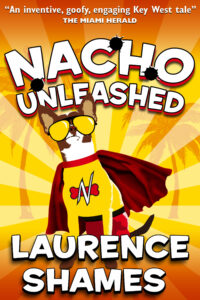
Some books—the writing of them, I mean—just seem to start themselves. A first sentence pops into your head. You hear a scrap of dialogue—either out in the world or between your own ears—that’s way too good to waste. Maybe a whole first scene plays out behind your eyeballs while you’re walking the beach or sipping wine or maybe even napping.
It’s a beautiful thing when it happens that way; but it didn’t happen that way with Nacho Unleashed. Not even close. I struggled with the opening. For months. The strange part was that I kept struggling with it even after I had most of the middle thought out. I’d already fallen in love with my protagonist—the feisty, wise-cracking Rita. I was tickled by a supporting character who’d been working on his suicide note for thirty years. I knew there was a rum distillery, a rogue chemist, and a seeming bad guy who turns out to be (mostly) a good guy; and, of course, I had Bert the Shirt just itching to stick his nose into other people’s business. In short, I had a lot of stuff I looked forward to writing but I couldn’t quite seem to get the damn book started. This did nothing good for my mood. Ask my wife if you doubt it.
Anyway, one morning, after weeks of jettisoned beginnings, I just thought, Screw it, let the dog tell the story.
I recognized at once that this was a terrible idea. Ridiculous. Preposterous. Born of desperation more than inspiration. But as I thought it over, the notion rephrased itself: Why not let the dog tell the story? Nothing else was working anyway.
So I tried the opening yet again, this time from the point of view of a four-pound Chihuahua standing eight inches high—and, bingo, to my amazement, it just felt right. Fresh again. Clouds, people, palm trees—everything looked different and new and amusingly warped from that low angle. The familiar beach was suddenly an exotic place filled with intoxicating smells. Taken-for-granted human rituals—shaking hands, smiling, clinking glasses—suddenly seemed utterly peculiar. Then there were important matters like friendship and loyalty; we have a pretty good idea of what those notions mean to people, but how do they look to the creature at the other end of the leash? What would a Chihuahua make of human romance, human ambition, human jealousy, duplicity, revenge?
Writing as a dog seemed to give me permission to explore those themes and many others with a freedom that’s tough for authors to claim these days. So many land-mines out there in the world of human discourse! For a dog, things are simpler but no less rich. Since dogs don’t generally talk, still less argue, still less scream at one another, a talking dog would be free to say exactly what he thinks. Honestly, directly, without an agenda, without malice, but also without apology. He could just tell it as he sees it.
And, come to think of it, isn’t that what readers look for in a narrator—whether on four legs or two–whom they can warm up to and trust?